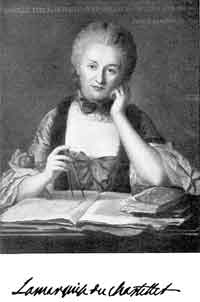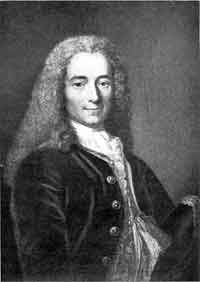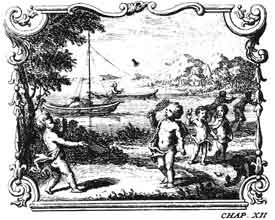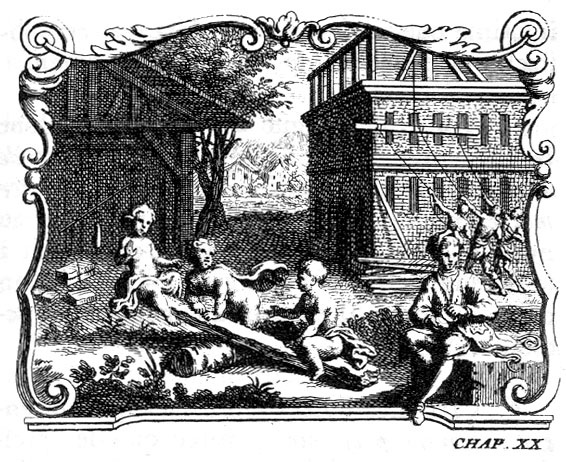
University of California, Irvine
Instructor: Dr. Barbara J. Becker

|
|
|
Émilie du Châtelet was born in Paris. Her father was the head of protocol at the court of King Louis XIV. She was tall and clumsy as a child, but was always quick to learn. Deprived of a formal education, Émilie hired her own teachers to help her learn languages and mathematics when she was grown up. She married the Marquis du Châtelet when she was only 19. Her husband was a military officer who was often away from home. Émilie took the liberty of inviting mathematicians, philosophers, and writers from all over Europe to spend time at her chateau in Cirey (see-RAY), about 150 miles east-south-east of Paris. One of Émilie's closest friends was the controversial author and philosopher, Voltaire. Her study of science and mathematics sparked a real interest in scientific experimentation in him as well. From the summer of 1734 until her death from childbed fever in 1749, Émilie and Voltaire studied and debated the physical phenomena they observed in their home-based laboratory. She served as Voltaire's secretary, protectress, and translator. After helping Voltaire to write a commentary on Newton's Principia, she became motivated to write her own popular account of Newton's work in French. She began writing this in secret as a textbook from which to teach her nine-year-old son. She intended this book to be a different kind of introduction to the new physics--addressing questions about the nature of matter which she felt Newton had sidestepped. |

|

|
Perhaps better known for his satirical and philosophical writings, Voltaire was, for a time, motivated to study physical phenomena. He had visited England in the late 1720s, and had even attended Newton's funeral, but his real interest in scientific matters developed in response to his contact with Émilie du Châtelet. While Émilie studied science for its own sake, Voltaire's primary interest was to enrich the world of letters through scientific knowledge. As happened often in Voltaire's career, the publication of a book got him in trouble with the authorities. Threatened with imprisonment, he was offered sanctuary by Émilie at her country chateau in Cirey. Cirey soon became an active center of literary and philosophical life attracting many intellectual notables. Voltaire became inspired to write a serious interpretation of Newton's Principia and vigorously supported Newton's views on motion and the structure of matter. |
A Description of Émilie du Châtelet
by Mme du Deffand--
an acquaintance and occasional houseguest
Picture, if you will, a tall, unfeeling female with a flushed complexion, a sharply angled face, a pointed nose. That's the face the fair Émilie presents, a face which so delights her that she will stop at nothing to show it off--curling her hair, wearing gaudy ornaments, gems, and baubles--everything in excess. But since she wants to be beautiful in spite of her natural looks, and magnificent in spite of what fortune has bestowed upon her, she must do without necessities, like undergarments and other trifles, in order to afford her luxuries.
She was born with enough intelligence, but in her desire to appear smarter than she is, she has chosen to study science instead of far more pleasant subjects. She believes that by such odd behavior, she will acquire a greater reputation and an advantage over all other women.
She hasn't limited herself to this goal, however. She wants to be a princess, and she has become one, not by the grace of God or that of the king, but by her own say-so. She became obsessed with this notion like everything else. Now everyone's become so used to her royal charade, they've nearly forgotten that she's actually a woman of some social standing.
Madame goes to such trouble to appear to be what she is not that no one knows what she really is any more. Her flaws may not be innate. Perhaps they are linked to her pretensions: her aloofness to playing the part of a princess, for example, her coldness to playing a scientist, and her giddiness to playing a pretty woman.
No matter how well-known Madame du Châtelet may be, she will be unhappy unless she is talked about. She has achieved this by becoming the friend of Monsieur de Voltaire. He's the one who brings glamour to her life. It is to him that she will owe her immortality.
![]()
In 1736, the Academy of Sciences in Paris announced a competition. Scientists were invited to conduct experiments on the nature of fire and submit their results and conclusions. Entries had to be received by September 1, 1737.
Voltaire made plans to enter this scientific contest. He began his research at Cirey, Émilie du Châtelet's chateau. He weighed many kinds of materials before and after they were burned to see if he could measure the weight of fire.
Émilie observed her friend's experiments and came up with her own ideas. Secretly, she wrote down these ideas, working late at night while everyone else was asleep. It was hard to stay awake. She sometimes paced up and down, and always kept a container of ice water nearby so she could jar herself awake by putting her hands into it when she got drowsy.
Just before the deadline, she submitted her own essay on what fire is made of. Neither Voltaire nor Émilie won the prize, but when the prize winner was finally announced and the list of names of all those who had entered the competition was published, Émilie admitted to her secret.
Here's a portion of a letter Émilie wrote to Pierre Louis Moreau
de Maupertuis, a mathematician and friend:
|
21 June 1738
My Dear Sir--
I bet you were astonished that I had the nerve to write a report for the Academy competition. I wanted to test my skills without anyone knowing it was my work. My husband was the only one I told and he kept my secret so well that he said nothing to you in Paris. I was unable to do any experiments because I was working without Monsieur de Voltaire's knowledge and it would have been impossible for me to hide them from him. I didn't think of starting this project until just a month before the competition deadline. I was only able to work at night and everything about it was completely new to me. Voltaire's own work was nearly finished by the time I started on my own. What he was doing filled me with ideas and the desire to carry out my own investigations. I set myself to work not knowing if I would send in my own report. I said nothing at all to Voltaire about what I was doing because I did not want to be embarrassed by an undertaking that I feared would displease him. What's more, I argued against almost all his ideas in my work. I only confessed after I saw in the gazette that neither of us had won a share in the prize. |
In 1705, an anonymous pamphlet titled The Grumbling Hive was circulated in England. It contained a set of satirical fables written both to entertain and to expose the hypocrisy and greed of society. In 1723, a new edition of the pamphlet was published under the title The Fable of the Bees. This time the author revealed his name. It was the essayist Bernard Mandeville. Everyone who read these fables had an opinion about them. The result was a lot of argument and discussion.
After she learned to read English, Émilie du Châtelet enjoyed reading Mandeville's fables, too. She decided to translate them from English into French so more people could read and learn from them.
When she had finished this difficult task, Émilie wrote an essay
to explain to the reader why and how she had made her translation.
In it, she included an impassioned plea for the rights of women.
Émilie believed women, like men, should be encouraged to develop
their natural talents and improve their minds. She recognized the
importance of education in preparing women to trade their roles as decorative
observers of worldly affairs into active and creative participants.
Her words were written in 1735. What can we learn from them today?
|
"The Translator's Preface" by Émilie du Châtelet (1735) The prejudice that excludes us women so universally from the sciences weighs heavily on me. It has always astonished me that there are great nations whose laws permit us to control their fate, but there is not a single place where we are brought up to think. This is one of the great contradictions of our times. The theater is the only profession requiring some study and some cultivation of wit in which women are allowed to participate. At the same time, it is a profession that has been declared an improper one. Just think for a moment. Why is it that for so many centuries not a single good tragedy, fine poem, valued story, beautiful painting, or good book on physics has been produced by the hand of a woman? Why do these creatures--whose understanding appears to be similar in every way to that of men--seem to be held back by an insurmountable force? Let someone give me a reason for it, if they can. I leave it to the naturalists to find a physical reason for it, but until they have found one, women have a right to speak out for their education. I confess that if I were king, I would conduct the following experiment. I would correct this abuse that has cut short a full half of the human race. I would get women to participate in all the privileges of humanity, especially those of the mind. It's as though women were born only to flirt, so they are given nothing but that activity to exercise their minds. The new education I propose would do all of humanity a great deal of good. Women would be better off for it, and men would gain a new source of competition. All too often, the way we currently conduct our daily affairs weakens and narrows women's minds rather than improves them. With men and women as equal partners, such interactions would serve to extend everyone's knowledge. I'm convinced that most women are either ignorant of their talents, or they cover them up. Everything I've experienced myself confirms this opinion. I've been lucky to know men of letters who have included me in their circle. I saw with extreme astonishment that they held me in high esteem. I then began to believe that I was a thinking creature. |

|
If the resistance is not invincible, the force is called a living force, because it is able to produce a real effect.
The quantity of living force makes itself known by the number and the size of the obstacles that the moving body is able to disturb in exerting this force.
There are great disputes among philosophers to determine if living force and dead force must be estimated differently.
 |
Without entering into the difficulties of measuring this living force, one easily sees that it is another dimension of dead force, that it is to dead force as a line is to a point, or a surface to a line.
Mr. Leibnits who discovered the first true measure of living force has taken great trouble to distinguish these two forces, and has explained their differences so well that it is impossible to mistake or confuse them, if instead of reacting negatively against this discovery, one has examined it.
It is demonstrated by the theory of Galileo that the distance a body falls in equal times by virtue of gravity is proportional to the square of the body's velocity, thus the living force that bodies acquire in falling are also proportional to the squares of their velocities, since the force is proportional to the distance.
This assertion appears at first as a kind of heretical physics. Where does the square relationship come from, you ask? But you see by what has just been said that it is easy to deduce it from the accumulation of all the pressures that have acted on the body over small increments of time.
All experiments have confirmed and shown in all cases that the force of moving bodies is proportional to the square of their velocities multiplied times their mass, and this estimation of force is based on one of the most fruitful principles of mechanics.
Philosophers agree on the experiments that prove this estimation of living force and they all agree that the displaced materials, the extended springs, the pressed cloth, the transmitted forces, etc.,--all the effects of moving bodies--are always proportional to the square of their velocities multiplied by their masses.
It would seem at first that there is no need for any dispute at all on this matter. Since everyone agrees that all force is equal to its effect, and that uncontested experiments prove that the effects of moving bodies are as the squares of their velocities multipled by their masses, it would seem necessary to conclude that the forces of these bodies are also in that same category.
The adversaries of living force believed they could escape this conclusion by taking into consideration time, which, they said must always be the common measure of two forces that one wishes to compare. But to be able to produce greater effects, and act during more time, a body needs to have more force. And the measure of this force must be that based on what the body can do from the time it begins to move until it exhausts all its force, regardless of the time it takes. Time doesn't have to enter into consideration any more than the measured wealth of a man depends on whether he spends it all in a day, a year, or a century.
To measure a body's force requires being able to observe its effect. If a body meets others that make it move, then I will be able to estimate its force by the quantity of effects it produces in using up that force. The force destroyed is always equal to the effect that it produces, regardless of the time in which it was produced.
![]()
In the year 1733, I met a like-minded young lady who invited me to spend time at her country chateau where we could cultivate our minds far from the hustle and bustle of the city.
This lady was none other than the Marquise du Châtelet. She had the most capable scientific mind of all the women in France. Her father had taught her Latin. She could recite from memory the most beautiful passages of all the ancient poets. But she was most interested in mathematics and metaphysics. Few other individuals have possessed such keen perception, elegant taste, and desire for knowledge.
She loved to socialize and play, but she decided to set that all aside to pursue her studies. She beautified her old chateau with pretty gardens. I built a small museum to house a rather nice natural history collection. We also had a good library. Many visitors came there to learn and share ideas.
I taught her English. In about three months, she understood it as well as I did. She read Newton and other English writers. She learned Italian just as quickly.
In this, delightful place, we devoted ourselves to learning. We focused all our energy on the ideas of Leibniz and Newton. Madame du Châtelet was first attracted to the ideas of Leibniz. She wrote an excellent book about them titled, Institutions de Physique. Her style is clear, precise, and elegant.
She soon applied herself to the discoveries of the great Newton as well. She translated his whole book, Principia, from Latin into French. Newton's ideas are very difficult for the average person to understand, so she later added her own helpful explanations to make them easier to follow.
![]()
On the Death of
Madame la Marquise du Châtelet
by Voltaire
(adapted from his preface to Émilie's translation of Newton's
Principia)
Gabrielle Émilie de Breteuil, wife of the Marquis du Châtelet-Laumont, lieutenant-general of the King's army, is the author of this translation of Isaac Newton's Principia. It is a work which France's greatest scholars should have undertaken and which all others should study if they wish to learn the science the world owes to Newton
It is unusual for a woman to know simple geometry, let alone the sophisticated mathematics needed to understand the ideas in Newton's immortal work. Clearly, Mme la Marquise du Châtelet has mastered the teaching of that great man. We have seen two miracles: one, that Newton wrote this work in the first place; the other, that a lady has translated and explained it.
It is not her first work. She had previously written an account of Leibniz, titled Institutions de physique, which she addressed to her young son.
Mme du Châtelet has rendered a double service to future generations of scholars in both translating the book Principia and in enriching it with her own explanations. It's true that Principia was written in Latin, a language which is understood by all scholars, but it's exhausting to read about abstract matters in a foreign language. Besides, Latin does not have the words and phrases needed to express modern ideas in mathematics and physics.... French, a language used by people all over Europe, doesn't have this problem. Because it contains a more up-to-date vocabulary, it's more suitable than Latin for spreading this new knowledge throughout the world....
The remarkable nature of her great accomplishment makes her premature death all the more deplorable. She had not finished writing her explanations when she foresaw that death would carry her off.... From that time on, her one thought was to make use of the little time she had left to finish what she had started and to deprive death of what she regarded as the best part of herself. Overwork and lack of sleep when rest might have saved her finally brought about the death she had foreseen.
She felt the end approaching with mixed feelings that seemed to struggle with one another. On the one hand, she regretted leaving life and yet she looked boldly on death. Her sorrow and her firmness at this time can be crudely likened to the image of a man sadly tearing himself away from his distressed family while calmly making preparations for a long journey. Those who witnessed her last moments felt her loss doubly through both their own distress and her regrets. Still they admired the strength of her spirit.
Mme du Châtelet died at the palace of Luneville, on 10 September 1749, at the age of forty-three years and six months. She was buried in the neighboring chapel.
|